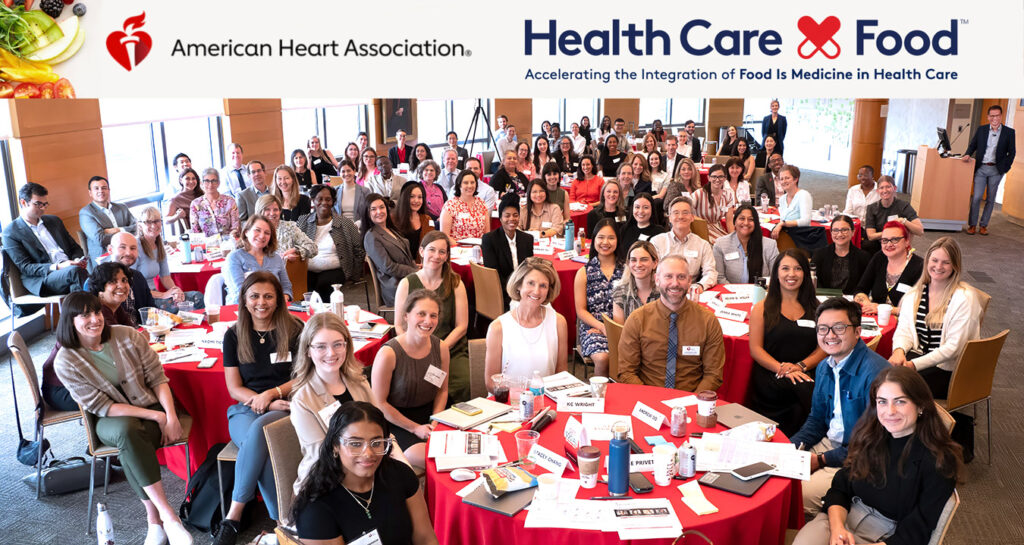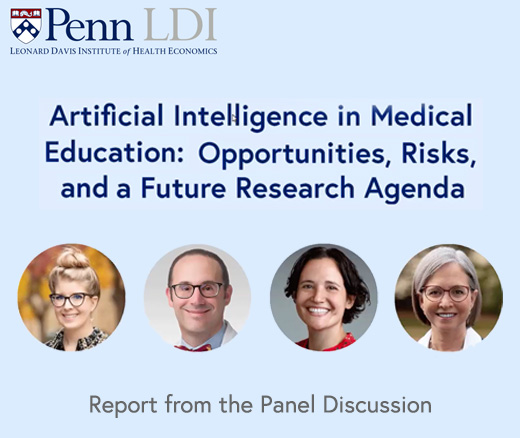
Hospital Mergers Don’t Make Care Better—They Just Make It Pricier, LDI Fellows Say
A New Review Finds Hospital Mergers Raise Prices Without Improving Care, and Urges Regulators to Stop Accepting Quality Claims to Justify Consolidations
Population Health
News

University of Pennsylvania Perelman School of Medicine Professor and Leonard Davis Institute of Health Economics Senior Fellow Kevin Volpp, MD, PhD, has become the Scientific Leader of a new national 10-year, $250 million research and advocacy program designed to find cost effective approaches to improving health through greater access to healthy food for patients with chronic conditions and food or nutrition insecurities (not enough food or unhealthy diets). The initiative is called Health Care by Food™ (HCXF).

Coordinated by the American Heart Association with support from the Rockefeller Foundation and other funders, HCXF involves more than 100 researchers and members of 25 community-based organizations and food-related companies across the country.
“The vision for the Health Care by Food™ initiative is to accelerate a future in which millions of patients are receiving the benefit of healthy food to improve health,” said the Association’s Chief Science and Medical Officer Mariell Jessup, MD, FAHA. “It’s for providers to know how to target and use food is medicine programs to help prevent and manage disease, and for payers to have sufficient and objective cost and effectiveness evidence for reimbursing food is medicine programs.”

“We all know food is central to health outcomes and affects many different organ systems in the body,” said Volpp. “And yet we also know that Americans don’t have very healthy diets. This initiative is about generating evidence and tools to help the health sector design and scale programs that increase access to nutritious food, improve health and health equity, and reduce overall health care costs.”
Volpp, the Mark V. Pauly President’s Distinguished Professor at the Perelman School of Medicine and the Wharton School, and Director of the Penn Center for Health Incentives and Behavioral Economics (CHIBE) is an internationally-renowned expert in the field of behavioral economics.
About 20 CHIBE faculty members and staffers are involved in HCXF’s various task forces.
In January, the Association’s HCXF program announced its first round of $8.4 million in research grants for 21 projects. The first in-person convening of all the participants took place on April 29-30 in the Wharton School’s Huntsman Hall on the Penn campus.
The gathering brought together researchers from 20 universities including Johns Hopkins, Yale, University of Kentucky, Ohio State University, Stanford University, Tufts, Duke, UNC Chapel Hill, and the University of Texas Houston, and; a dozen major health systems, including Geisinger, the Cleveland Clinic, and UCSF; collaborators from food delivery services, including Instacart and Fresh Connect; and state and local nutrition-related institutes and community based organizations such as God’s Love We Deliver, the Family Health Council of Central Pennsylvania, and Hispanic Health Council. The meeting was run as a design workshop with facilitation from Stacey Chang, MS, and Natalie Privett, PhD, who had created the Dell Institute for Design at the University of Texas at Austin’s Medical School before founding New Origin Studios.

Executive Vice President of the Rockefeller Foundation Elizabeth Yee told the audience: “The Foundation has made its mission to advance the well-being of humanity and tackle the big problems that stand in the way of this reality. One of the challenges that we see is the dichotomy that currently exists between our health care system and food systems. The U.S. currently has the lowest life expectancy among wealthy countries, while having the highest per capita health care spending. In other words, our current system is great at purchasing health care services, but not so great at buying health outcomes.”
“Initial research has shown us that food is medicine policy has the potential to address these problems and that we can greatly improve health outcomes, especially for underserved Americans, while reducing health care spending,” Yee continued. “But we need to better understand how to unlock that potential. And to do that, we need to build the evidence base to help us learn which programs work best for which patients. We need to figure out how to build the necessary infrastructure to deliver these programs across the country. And we need to ensure that we’re continually spreading awareness of the benefit of food is medicine to patients, providers, and payers.”
According to the most recent data from the U.S. Department of Agriculture (USDA), in 2022, an estimated 44.2 million people in the United States lived in food-insecure households struggling to get enough affordable, nutritious food.
A sample of some of the currently funded 21 HCXF research project titles demonstrates the initiative’s focus on the food needs of underserved populations:
The idea for what became the HCXF research initiative was first publicly announced at the September 2022 White House Conference on Hunger, Nutrition, and Health. Subsequently, the Association’s Journal Circulation published “Food Is Medicine: A Presidential Advisory from the American Heart Association,” a paper produced by a team headed by Volpp. The paper outlined the logic and blueprint for a national program to develop evidence to inform interventions that could drive nutrition-related sensitivities and solutions deeper into the daily operations of the national health system.
The advisory laid out the concept that initiative members are now implementing: “Food Is Medicine may be defined as the provision of healthy food resources to prevent, manage, or treat specific clinical conditions in coordination with the health care sector. Although the field has promise, relatively few studies have been conducted with designs that provide strong evidence of associations between Food Is Medicine interventions and health outcomes or health costs. Much work needs to be done to create a stronger body of evidence that convincingly demonstrates the effectiveness and cost-effectiveness of different types of Food Is Medicine interventions while prioritizing a human-centered design approach to achieve high rates of patient engagement and sustained behavior change.”
Volpp emphasized that health systems and insurer buy-ins are crucial to the success of the project. “There is growing recognition of the impact of social determinants of health and health behaviors among health systems and health plans,” Volpp said. “Part of the American Heart Association HCXF initiative’s goals will be to design program implementation in such a way so as to minimize incremental effort for the health system in referring patients with nutrition insecurity and chronic conditions, as appropriate, to food is medicine programs. As more and better evidence is developed it will become easier to know to which programs to refer individuals to help them improve their health as cost effectively as possible.”


A New Review Finds Hospital Mergers Raise Prices Without Improving Care, and Urges Regulators to Stop Accepting Quality Claims to Justify Consolidations

CMS’s Main Risk Adjustment Method Underestimates Rural Patients’ Health Risks, LDI Fellows Show, Potentially Reducing Access to Care in the Heartland

Experts at Penn LDI Panel Call for Rapid Training of Students and Faculty

A Proven, Low-Risk Treatment Is Backed by Major Studies and Patient Demand, Yet Medicare and Insurers Still Make It Hard To Use

New Study From LDI and MD Anderson Finds That Black and Low-Income, Dually Eligible Medicare Patients Are Among the Most Neglected in Cancer Care

Her Transitional Care Model Shows How Nurse-Led Care Can Keep Older Adults Out of the Hospital and Change Care Worldwide